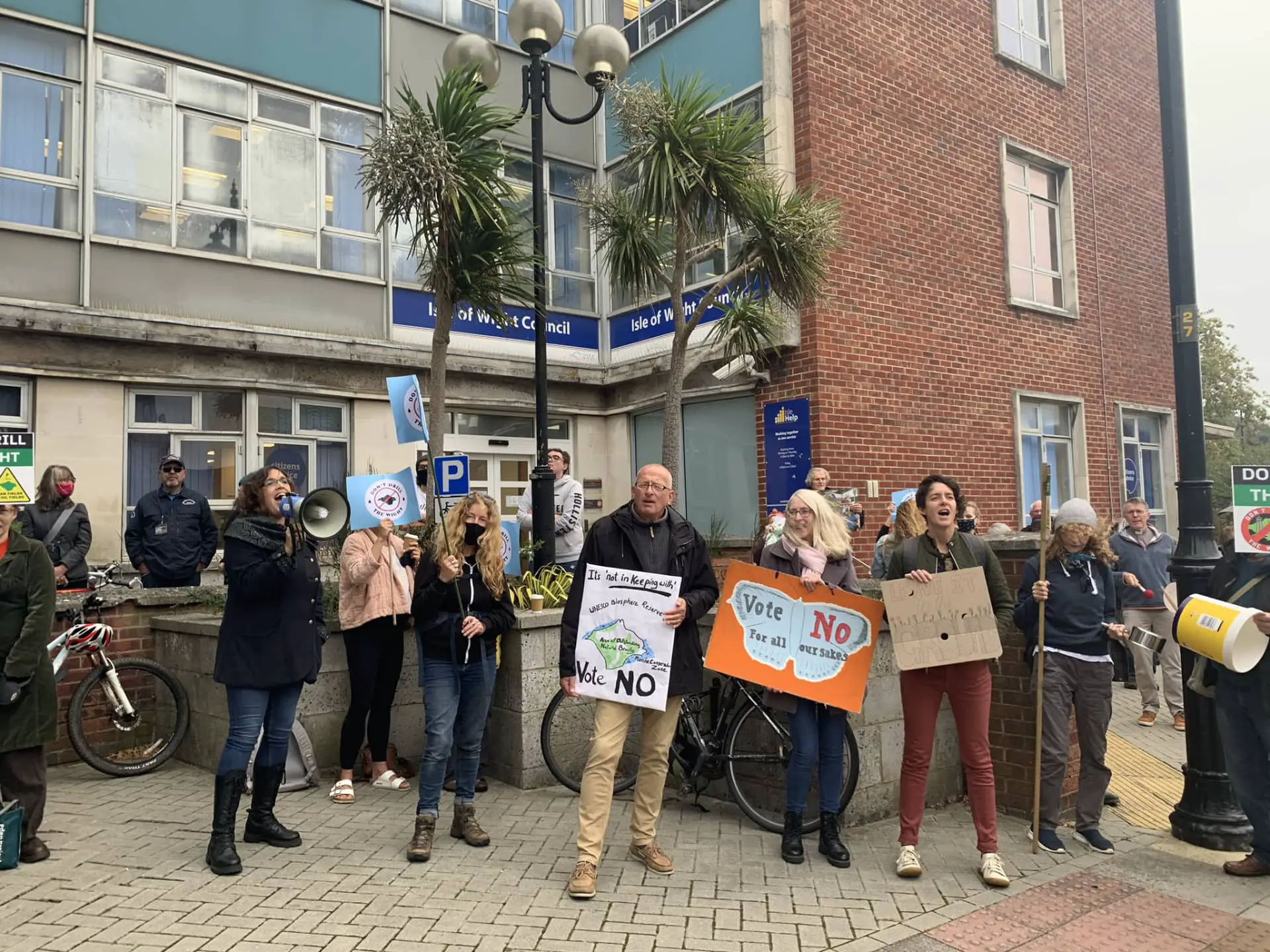The Isle of Wight council planning committee met this evening to consider the planning application for exploratory oil wells in the Arreton valley by UK Oil and Gas (UKOG).
Deliberation of the application has been a long time coming, with a strong campaign opposing the plans running for several years.
Committee members tonight (Tuesday) voted unanimously to refuse the application.
Thousands of objections
As well as thousands of objections from residents, a petition with over 4,000 signatures was also recently submitted.
Speaking against the application were Jonathan Idle (Green Party), Sylvia May (Don’t Drill the Wight) and Steve Bates (Don’t Drill the Wight) and Martin Kimber (Arreton Parish Council).
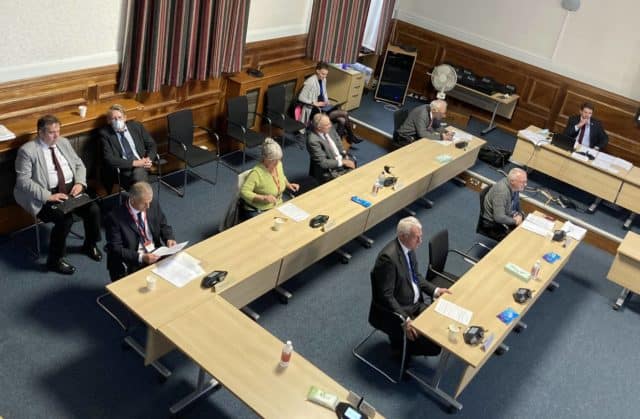
Speaking against the application
Jonathan Idle, said,
“The discussion is about the mitigation, harm and benefits. The amount of oil that might be found would be tiny, 13 days worth. … There is no economic benefit in exploration.
“The supposed economic benefit does not exist.”
Steve Davis, from Don’t Drill The Wight, said,
“You may encounter situations where your heart is telling you something is wrong and your head is telling you you do not have the means to refuse it, this is not one of those situations.
“This will damage everything it touches.”
Cllr Martin Kimber from Arreton Parish Council laid out a number of issues with the application, including the increased level of HGV traffic, wastewater disposal and bringing the site back to its original condition.
He said,
“Will this proposal benefit the Island? … We urge you to reject this application.”
Speaking in favour of the application
Matt Cartwright, the commercial director of UKOG, said UKOG estimates 18 million barrels of oil from the licence it holds on the Isle of Wight.
He also said relying on imports of oil makes no environmental sense.
He said,
“The renewable technology we need is largely still on the drawing board,
“Initial investment in the application is around £6 million, and if the site is successful it could increase to £30 million.”
Nigel Moore, the agent of the applicant, said,
“Exploration must follow the resource.” Drilling has happened in the area in 1952 and 1974.”
Mr Moore said,
“Planning officers find the site to be discreet, they attribute great weight to secure energy supplies…come 2050 we will no longer use oil and gas to heat our homes but it will remain the energy back up we need when the lights aren’t on and the sun doesn’t shine.”
Local member
Cllr Suzie Ellis, the local Isle of Wight council ward member, was unwell and unable to attend the meeting. Her speech was read out by Cllr Peter Spink.
Her speech included,
“I was elected on a pledge to stop damaging schemes like this … While the application is recommended for permission, it is clear it also raises marginal and competing policy issues. … I believe the adverse impacts are greater than the reported benefits.”
Adding,
“The applicant would have you believe this harm is negligible, it is not.
“The overarching effects of climate change should not be disregarded by the planning committee due to limited financial change. … We cannot get this wrong.”
Cabinet member for Environment
A speech from Cabinet member for Environment and Heritage, Jonathan Bacon (Alliance), was read out by a council planning manager, Ollie Boulter.
Cllr Brodie (Ind Lab) questioned why the Cabinet member, who has already expressed his view, was allowed to speak. The Chair said it was at his discretion.
Cllr Bacon’s speech included,
“I would suggest there is clear policy in place that directs this application to be refused … It is clear that why some may remain reliant on fossil fuels, it does not support new drilling.”
Members’ questions
Members of the committee were invited to ask questions. It started with Cllr Vanessa Churchman (Con), who asked,
“Apart from Red Funnel, where is the money coming into the Island?”
Russell Chick (the planning officer) replied benefits are at national scale. He read through a number of items that oil is an “important raw material” for.
He said the second exploration in the `1970s did confirm oil was present, but it wasn’t viable at the time to recover the oil.
“National policies say there should be an energy mix going forward and now, fossil fuels will be reduced, but not ruled out.”
Jarman: Only two days of UK supply recoverable
Cllr Chris Jarman (Alliance) pointed to a UKOG Corporate presentation in July 2021 that referred to the recoverables as being 2.5 – 2.7 million barrels, equivalent to two days of UK supply.
“Does it change view of planning officers and their weighting?”
Mr Chick replied it did not affect the consideration of his report, as he was aware of the information when he made his recommendation. He reiterated that the national policy guidelines do not specify amounts.
Brodie: Affect on tourism?
Cllr Brodie asked the officer to explain the weight given to potential negative affect on tourism, “as this area is well used by cyclists and walkers”.
Mr Chick replied that it was a difficult question to answer, but the officer conclusion is always finely balanced based on their experience, hence why this application was at Committee.
“Parts of the development will be visible and look out of place, but the harms are temporary.”
Quirk: Environment Agency
Cllr Chris Quirk (Con) asked why the Environment Agency had not commented. Mr Chick said the EA did comment “in a technical sense”.
The Planning Authority will not control everything this development would do, underground works falls to other regulatory bodies. Cllr Quirk asked whether the IWC were confident the EA have looked at the impact on aquifers and fully assessed the risk.
Mr Chick says the hydrogeological risk assessment considers the aquifers and how to minimise any risks. He was satisfied it has all been considered.
Price: Local benefit?
Cllr Price asked for three demonstrations of some local economic benefit and asked if there were any.
Mr Chick replied,
“Not particularly, no. It’s a temporary scheme. The benefits of oil are on a national basis.”
Oliver: Financial liability
Cllr Martin Oliver raised concerns for financial implications for the IWC, he asked who would be financially liable to clear up the site if UKOG walk away.
Mr Chick said financials are checked by other bodies, not the IWC. He said planning conditions would include restoration and the IWC would not be liable. The landowner would be liable.
Cllr Drew: Asbestos on site?
Cllr Warren Drew (Con) said there had been focus on the temporary nature of development, but that asbestos had been found on the site.
“Can we guarantee 100 per cent remediation of asbestos can take place.”
The officer replied that site surveys took place and found one small amount of asbestos on the site. The issue would be controlled by conditions.
Churchman: Traffic considerations?
Cllr Churchman asked whether consideration had been given in relation to traffic issues at the nearby junctions which get clogged up over the holiday season and where the water to wash the wheels of lorries would come from.
Officer said the volume of traffic is miniscule and not deemed to cause a highway capacity issue. He assumed water would come from tanks on the site.
The debate
Cllr Price explained that he comes from trade where combustion engines are key, but believes hydrogen will be the future (rather than electric).
He said the weighted decision would be on harm against the benefits. He said the national benefit was finding oil to burn, but believes if it is found he would assume it would be uneconomical to transport across the land, would have to be extracted from the sea and not involve IWC.
“I can only see negatives.”
Cllr Quirk said the “very low risk” to aquifers was a huge concern for him.
“If we don’t reject this, I think we should defer it and get chapter and verse from EA on what the risks are.
“I don’t accept a small risk is acceptable. We have to be totally convinced this is zero risk.”
Cllr Oliver referred to the 30 conditions and questioned whether the planning department would be able to ensure conditions are adhered to.
Cllr Claire Critchison (Alliance) said they need to ensure future integrity of AONB and Biosphere.
Risk of appeal
Cllr Brodie said he was against the application, but looking beyond the decision making process in the room and the potential appeal. He referred to Cllr Ellis’s plan to ask the Secretary of State to call in any appeal and wonders what officers thought about this.
The legal officer said it would be the Sec of State’s decision.
The Chairman, Cllr Michael Lilley (Alliance), said he is finding hard to see the benefits to the Island. He said three years of the development could devastate the tourism industry which is coming out of impact of Covid.
Recommendation for refusal
Cllr Churchman recommended refusal of the application for economic reasons, probable damage to tourism, damage to the infrastructure of roads and the environment.
Cllr Brodie said the committee needed to be more specific and include SP4 tourism and SP5 adverse impact on environment.
Cllr Price added SP5 protect integrity of local designations (Biosphere), DM12 Biosphere, DM13 7.211 green infrastructure, risk to water catchment, no defined local benefit, contrary to IWC’s climate strategy.
Risks of refusal
Mr Chick told members that they needed to understand the risks attached to refusal.
Regarding economic lack of benefit he said according to the national policy framework, decisions must give great weight to mineral developments, it does not say there should be local benefits.
On the net zero issue the Government guidance does not rule out use of oil.
SP4 is permissive and refers to accommodation and what we want for our tourism. Damage to roads was not an issue raised by Island Roads. On compromising the natural environment, officers would need more direction on what that harm would be – he said the statutory consultees have not objected. Regarding biodiversity, he said Natural England has not objected and there is a detailed ecological assessment.
On climate change he referred members to a recent judicial review that ruled downstream effects of oil and how it contributes to climate change should not be a role of planning authority.
The impact to landscape character is a finely balanced issue and officers say there will be harm, but it will be temporary.
The decision
After hours of deliberation, the Committee voted unanimously to refuse the application.
The reason for refusal was:
It would cause significant harm to landscape and visual quality and compromise the tourism industry. The economic benefits would not outweigh the harm and integrity of the landscape and biosphere status.
Following the meeting Cllr Ellis told News OnTheWight,
“I am absolutely thrilled that the members of the planning committee have unanimously refused this inappropriate application and thank them on behalf of all the residents that have contacted me, as ward member for Central Rural, to express their opposition to the proposal.
“Tonight we have sent a strong and clear message that the Isle of Wight can and will lead the way on environmental issues, and that we will protect the integrity of our Biosphere status.
“Given the significance of this scheme and how it runs contrary to the Government’s climate change, biodiversity and sustainability agenda, in the event of an appeal by the applicant I will be writing to the Secretary of State asking that he “recovers” the decision for his own determination. It is important that an application that goes to the heart of the Government’s policy agenda is decided by those who are politically accountable, just as we were here this evening. I am making this intention clear now, so that the applicant can decide whether pursuing an appeal, of what has been a unanimous refusal this evening, is a worthwhile step.”
Pre-meeting protest
Prior to the meeting residents against the plans met outside County Hall with banners and placards.
Click on images to see larger versions.
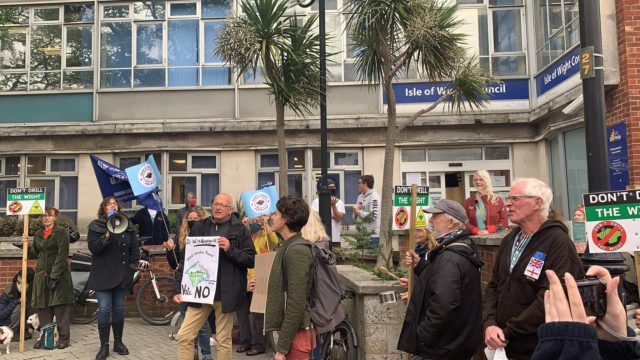
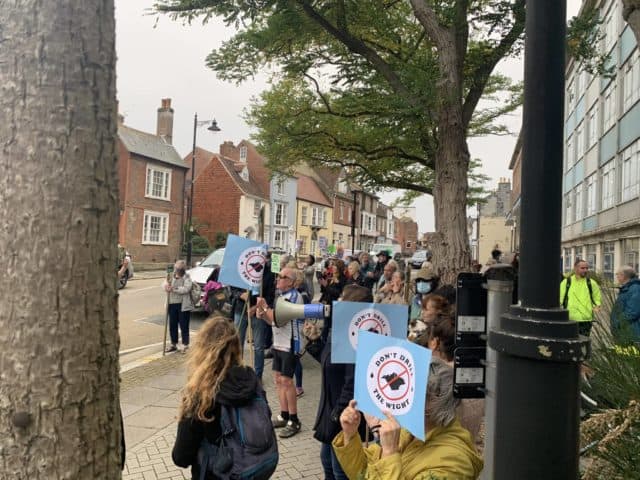
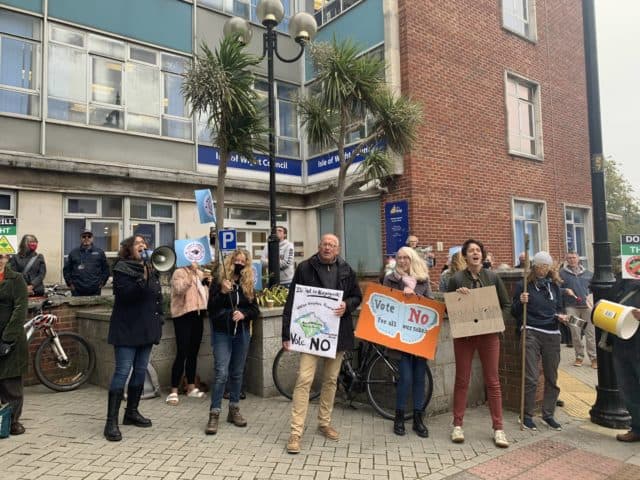
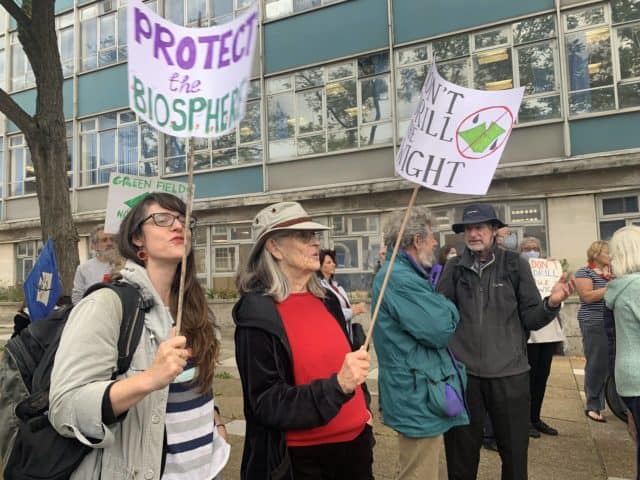
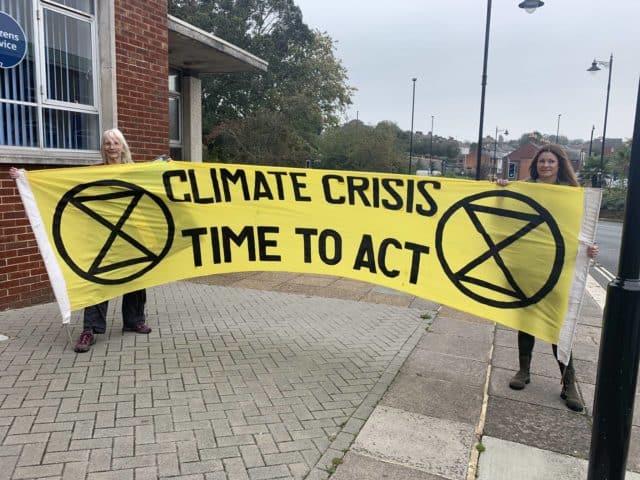
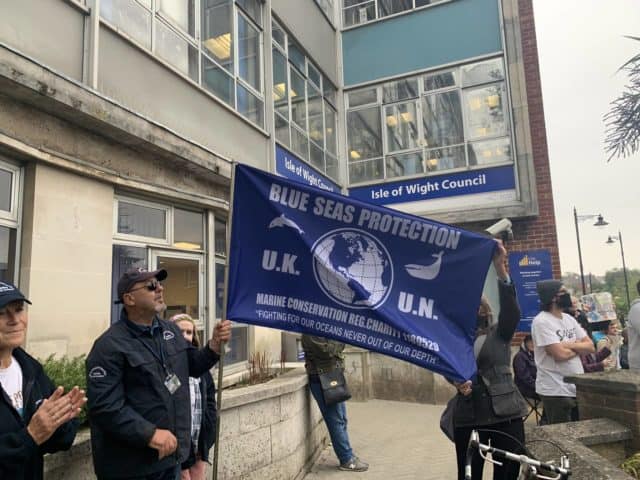
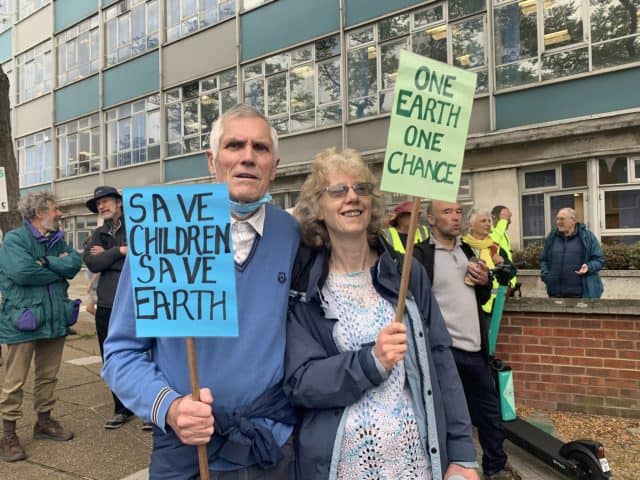
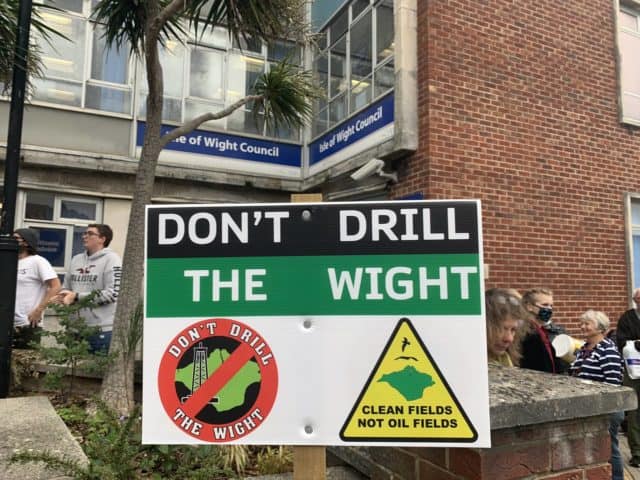
Photos and some quotes from meeting provided by BBC’s LDRS (Local Democracy Reporter Service), which News OnTheWight takes part in. Ed

